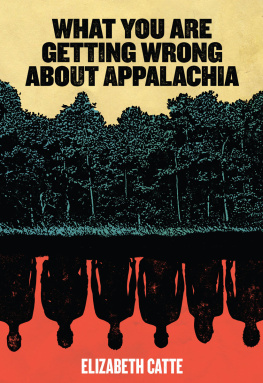Appalachia in Regional Context
Appalachia in Regional Context
Place Matters
Edited by
DWIGHT B. BILLINGS
and
ANN E. KINGSOLVER
Due to variations in the technical specifications of different electronic reading devices, some elements of this ebook may not appear as they do in the print edition. Readers are encouraged to experiment with user settings for optimum results.
Copyright 2018 by The University Press of Kentucky
Scholarly publisher for the Commonwealth,
serving Bellarmine University, Berea College, Centre College of Kentucky, Eastern Kentucky University, The Filson Historical Society, Georgetown College, Kentucky Historical Society, Kentucky State University, Morehead State University, Murray State University, Northern Kentucky University, Transylvania University, University of Kentucky, University of Louisville, and Western Kentucky University.
All rights reserved.
Editorial and Sales Offices: The University Press of Kentucky
663 South Limestone Street, Lexington, Kentucky 40508-4008
www.kentuckypress.com
bell hookss poems titled by the numbers 11, 16, 18, 40, 56, and 57 appear with permission from her collection Appalachian Elegy: Poetry and Place (University Press of Kentucky, 2012). The editors appreciate this powerful contribution to considerations of place.
Cataloging-in-Publication data is available from the Library of Congress.
ISBN 978-0-8131-7532-4 (hardcover : alk. paper)
ISBN 978-0-8131-7534-8 (epub)
ISBN 978-0-8131-7533-1 (pdf)
This book is printed on acid-free paper meeting the requirements of the American National Standard for Permanence in Paper for Printed Library Materials.
Manufactured in the United States of America.
| Member of the Association of
American University Presses |
Contents
Dwight B. Billings and Ann E. Kingsolver
Ann E. Kingsolver
Barbara Ellen Smith
John Pickles
John Gaventa
Mary L. Gray
Elizabeth S. D. Engelhardt
Carol Mason
bell hooks
Rich Kirby, John Haywood, and Ron Pen
Dwight B. Billings, Gina Caison, David A. Davis, Laura Hernndez-Ehrisman, Philip Joseph, Kent C. Ryden, and Emily Satterwhite
Numbered poems from Appalachian Elegy by bell hooks appear on pages 1 ()
no crops grow
when dense clay dirt
packed solid
defies
all manmade
intent to destroy
let a blessing come here
let earth
heal and rejoice
she has here
mother of grace
and constancy
wild roses bloom
scatter these hills
with beauty
that does not linger
offering still the promise of healing
and return
bell hooks
Introduction
Place Matters
Dwight B. Billings and Ann E. Kingsolver
This volume has grown out of myriad conversations. In Appalachian studies, broadly, people from around the world have discussed what it means to think about, represent or be silenced, and act in a region, exchanges that are akin to many other regional studies conversations about place and displacement, identities, voices, ecological and political histories, and imagined futures. More specifically, this collection was shaped by forty years of conversations in the Appalachian Center and Appalachian studies at the University of Kentucky, where a lecture series titled Place Matters was organized in 2011 and 2012 in which many of the authors participated. This book is by no means comprehensive in voice or scope, but it is inspired by groundedness of praxis in place, and by the practice of equitable listening, in Appalachian studies, across disciplinary and academic or community boundaries, among others, which is a skill needed now more than ever. Appalachia as a placethe oldest mountain region in the worldhas figured in various imaginings as a homeplace, a place of expulsion, a place of extraction, a literal and literary headwaters, Americas internal homogeneous, intolerant other, and a place of intense biodiversity and centuries-old connections to global diasporas and place-based agency and imaginative organizing.
There is a groundswell in the twenty-first century to connect past discussions of what it means to conceptualize Appalachia as a region, as Batteau discussed, of who Appalachians are, as Turner and Cabbell documented, and of what it means to organize as Appalachians to discuss more inclusively the use of place matters here is not meant to displace attention from racism and white supremacy as a violent form of othering in the Appalachian region and across the United States. Racialized discrimination requires constant focus and is included in this volumes discussion. This project is not intended to participate in the kind of painful silencing expressed in the Kentucky legislatures recent passage of Blue Lives Matter legislation, increasing penalties for violence against police officers, in response to the Black Lives Matter movement. Instead, we see othering by class, language, region, gender, and other dimensions of identity as rooted in the long-term denial of human equality justified through a racializing lens in the United States.
The essays in this volume are joined by the poems of bell hooks, first published in her book Appalachian Elegy: Poetry and Place,Wilson, whose work is set in Pittsburghare often left out of discussions of Appalachian art and literature. There are many ways in which individuals choose to contextualize their work.
This volume contests the too-ready pigeonholing of Appalachia as a regional topic rather than a generally applicable one, because that can mislead readers about an ability to relate across experiences in and of place. The project of discussing Appalachia in context, or contexts (as one anonymous reviewer noted), in this book is to consider the many ways in which the region is being, and has been, constructed by many processes and voices, and how that shapes discussions of the future of the region. Themes, voices, political projects, and the soil and water itself all travel. Migrants from Hungary to the coal camps of the early nineteenth century brought economic and political ideas that led to the creation of Himlerville, a worker-owned coal-mining collective in Kentucky, in the middle of a landscape of absentee-owned capitalist extraction. Indigenous residents of Appalachia resisted the nation-states violent land grab under Andrew Jackson, and indigenous Appalachians are not a historical stage in a chronology of Appalachia; instead, they are among the active voices in the region currently imagining its future. There are diverse histories and voices in the region, and as bell hooks describes in her chapter, those can be simultaneously affirmed and silenced in peoples experiences. Narrative, performative, and visual arts are one way in which the invisibility and inaudibility of diverse experiences and Appalachias global connections have been powerfully contested, as in the community-devised theater performance of













